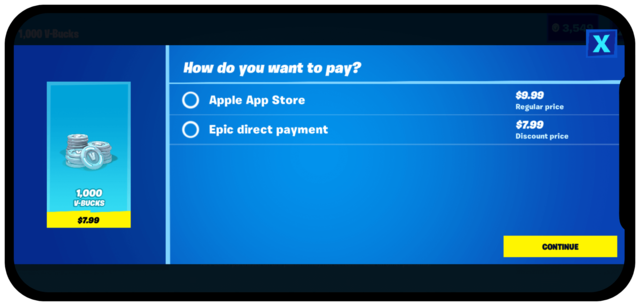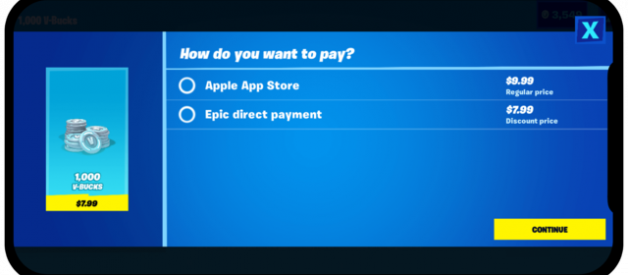This is an email from Pattern Matching, a newsletter by OneZero. Get this newsletter
Pattern Matching
Epic Games? ambush shows how antitrust scrutiny has changed the app store landscape

Welcome back to Pattern Matching, OneZero?s weekly newsletter that puts the week?s most compelling tech stories in context.
On Thursday morning, Fortnite maker Epic Games made a big announcement to the game?s hundreds of millions of users: It was dropping the price on V-Bucks, Fortnite?s in-game currency, by 20 percent. The ?Fortnite Mega Drop,? as Epic called the promotion, took effect immediately on every platform on which the wildly popular battle royale game is available ? with one caveat. On iOS and Android mobile devices, you had to choose a new payment method, called ?Epic direct payment,? rather than pay through the App Store or Google Play Store, in order to get the discount.
This violated Apple and Google?s rules, and Epic knew it. Both app stores take a significant cut of the app purchases, subscriptions, and in-app payments made on their platforms ? 30 percent, in most cases. And, with a few exceptions, they don?t allow apps to advertise ways for users to cut out the middleman by paying their creators directly. But that?s exactly what Epic was doing with its ?direct payment? option, which let users pay via PayPal or credit card rather than through Apple?s system, and passed most of the savings on to the gamers. The scheme was calculated to get users? hopes up ? and to dare Apple and Google to dash them. It worked.
The Pattern
The mobile-app duopoly is under siege.
- First Apple, then Google, booted Fortnite from their app stores on Thursday, just hours after the game started offering users the promotion. The move does not prevent the game?s existing users from continuing to play on those platforms, for now. But it means no one else can download Fortnite, and Epic can?t update it, which will gradually render the game obsolete unless the companies strike a deal.
- Epic Games, the North Carolina-based creator of Fortnite and the widely used game-development framework Unreal Engine, was ready. It immediately responded with a short video called ?Nineteen Eighty-Fortnite,? which skewered Apple?s iconic 1984 ad presenting its Macintosh computer as a revolutionary upstart challenging the dominance of corporate giants like IBM. In Epic?s video, which aired first as a virtual event inside the Fortnite game, the company presented itself as the upstart challenging Apple?s hegemony. (I wrote about the growing importance of Fortnite?s in-game events in a previous Pattern Matching.)
- The spot was a hit: By Friday morning, it had racked up more than 2 million views on YouTube. An accompanying hashtag campaign, #freefortnite, trended on Twitter.
- That wasn?t all. By day?s end, Epic had filed antitrust lawsuits against both Apple and Google, accusing them of ?anti-competitive restraints and monopolistic practices.? The 60-page court filings made it clear that Epic had been preparing to spring this trap for weeks, if not months, and had gamed out the next steps. As tech investor M.G. Siegler joked: ?Apple is playing checkers here while Epic is playing Fortnite.?
- If you?re wondering why Epic seems to be focusing its fight against Apple more than Google, it?s because Apple maintains a tighter grip on iOS than Google does on Android. Specifically, Android allows third-party app stores, while iOS prohibits them. That means people with Android devices can still download Fortnite from Epic Games? own app store, which it launched in 2018, even after it disappeared from the Google Play Store. iPhone and iPad users have no such option.
- Apple responded with a statement painting Epic?s ploy as disingenuous. It noted that the company has had apps on the App Store for 10 years and has benefited greatly from its presence there. Now Epic?s ?business interests? lead it to push for a ?special arrangement? that would be unfair to other developers, Apple said. There?s truth in that portrayal. But it doesn?t do much to make Apple look better ? because Epic is hardly the only developer that views it as a monopolistic bully.
- The timing of Epic?s assault on the app store duopoly is no accident. It comes amid antitrust investigations into Apple?s app store policies by the U.S. Department of Justice, the U.S. House antitrust subcommittee, and the European Union. Google is also in multiple jurisdictions? crosshairs. Just weeks ago, Apple CEO Tim Cook was pressed on the company?s ?Apple tax? by members of Congress in a landmark hearing that dominated front pages. Earlier this year, a series of developers testified to the same subcommittee on Apple?s anticompetitive practices. I wrote in depth in February about those developers? complaints, the broader antitrust argument against Apple, and why its longstanding App Store chokehold might finally be in jeopardy.
- The scrutiny has increasingly emboldened developers to challenge Apple?s rules in ways they hadn?t dared to before. In June, the developer Basecamp launched an email app called Hey without an in-app payment option, prompting an Apple takedown and a public backlash. Apple took a hard line at first, but its stance softened as pressure mounted, and in late June it struck a compromise to bring Hey back to iOS.
- For years, Apple has cultivated a fear among developers that one wrong move could ruin their business. While at first blush iOS doesn?t look like a monopoly ? it battles Android intensely for market share ? its wealthier, more loyal user base allows it to act like one. As Basecamp?s David Heinemeier Hansson told me in February, ?If you want to publish modern software, it?s essentially suicide not to have a presence on the iPhone.? Now, it seems, the antitrust spotlight has weakened its deterrence capacities. As antitrust pundit Matt Stoller noted, Epic Games? lawsuit cites testimony from the recent hearings. Spotify, which has its own battle with Apple, applauded Epic?s stance, and even Facebook criticized Apple?s fees.
- Epic Games is not a small business: A recent fundraising round valued the North Carolina-based startup at $17 billion, and the Chinese behemoth Tencent holds a significant ownership stake. Fortnite alone has 350 million registered users, and Unreal Engine is a market-leading game engine.
- But that?s exactly what makes it a potent standard-bearer for the fight against Apple. Fortnite?s massive user base spanning numerous platforms, including consoles and PCs, makes it one of the very few apps that could survive without iOS, if it needed to. CEO Tim Sweeney has been publicly railing against Apple?s policies and positioning Epic Games as a platform in its own right. Last month he blasted Apple for trying to grab a 30 percent cut of classes booked through apps on its platform after the pandemic forced them to move online. (Apple makes an exception to its fee rules for apps that connect users with certain classes of physical, offline products and services, as opposed to online ones.) Epic can afford to take a stand that others can?t.
- Epic?s gambit has left Apple with few winning moves. If Apple bends its payment rules for Fortnite, the floodgates will open to challenges from other developers. If it holds firm, it risks losing avid Fortnite players to Android, gives high-profile fodder to antitrust investigators, and comes out looking like the bad guy. And that?s before we even get to the lawsuit itself. As the New York Times put it: ?In Epic, Apple has met arguably its toughest adversary in years. The game maker has calculated exactly how to hit Apple where it hurts: by making iPhones less attractive and Apple less cool.?
- No doubt Apple is already scrambling to find a face-saving compromise that keeps its rules largely intact. But if Epic isn?t interested in compromising, Apple may find itself having to back down on at least one of three fronts: the size of the cut it takes, its restrictions on third-party app stores, or its restrictions on apps encouraging users to pay directly. Allowing third-party app stores would probably do the most to appease regulators, while losing Apple the least money in the short run, because relatively few users would likely take advantage of those ancillary app stores anyway. But it would represent the biggest hit to Apple?s control over the iOS ecosystem, and would come with security risks that could impact users. A more palatable, if financially painful, option might be to ease its restrictions on apps that inform users of direct payment alternatives ? a solution that might look a lot like the V-Bucks scheme that it just banned.
- One thing is clear: The antitrust investigations are already having an impact, even before they?ve concluded or led to any new laws or charges.
Undercurrents
Under-the-radar trends, stories, and random anecdotes worth your time
- Kamala Harris is viewed as a tech-friendly VP pick, though there should be some caveats. As Politico reported in a 2019 profile, she rose to prominence with the backing of the Bay Area?s elite. Emails uncovered by HuffPost last month showed she has been friendly with Facebook COO Sheryl Sandberg and other tech leaders. She raised money for her presidential primary campaign from LinkedIn?s Reid Hoffman and Kleiner Perkins? John Doerr, Recode reported; she has been praised by Salesforce?s Marc Benioff and was invited to early Facebook executive Sean Parker?s wedding. Those ties were reflected in her campaign platform: While rivals such as Elizabeth Warren called for breaking up Big Tech, Harris told the Times she would focus instead on basic privacy protections. All of which helps to explain why Biden?s selection of Harris as his running mate, and heir apparent should he win the election, prompted headlines such as Fortune?s ?Kamala Harris could be the best thing that ever happened to Big Tech.? But Harris?s policy planks have often proven malleable, including on police reform, and no one should be shocked if she turns against big tech companies at some point. If she does, she could prove a formidable foe, given her background as a prosecutor. Here?s a clip of her pressing Mark Zuckerberg on why Facebook didn?t inform users of the Cambridge Analytica breach, from a 2019 hearing.
- Companies are increasingly using race-detection software for marketing and data analysis. ?Facial analysis has largely flown under the radar, even as facial recognition has come under fire because poorly trained systems have misidentified people of color,? the Wall Street Journal reported. Brian Brackeen, the former CEO of face recognition company Kairos, once backed the technology, but now worries it could fuel discrimination. Those fears are not merely theoretical: In China, ?surveillance cameras have been equipped with race-scanning software to track ethnic minorities,? the Journal pointed out.
Threads of the Week
- How the QAnon conspiracy has flourished on Facebook and Instagram since the lockdowns, by the Wall Street Journal?s Deepa Seetharaman.
- Could Canada?s federal contact-tracing app, COVID Alert, actually be? good? Voting Works? Ben Adida says yes, though Brock University?s Blayne Haggart begs to differ.
Update: A previous version of this article misspelled the name of Basecamp?s co-founder. It is David Heinemeier Hansson.
Thanks for reading Pattern Matching. Reach me with tips and feedback by responding to this post on the web, via Twitter direct message at @WillOremus, or by email at [email protected].


